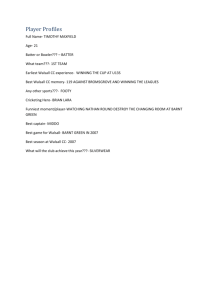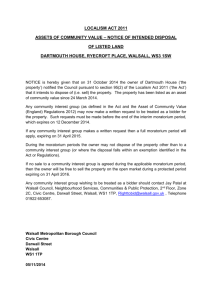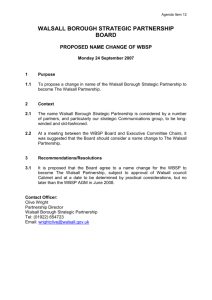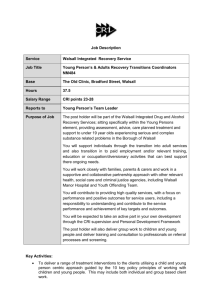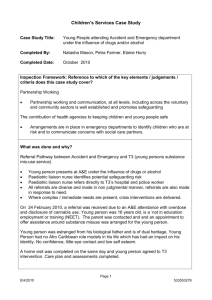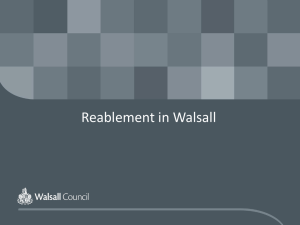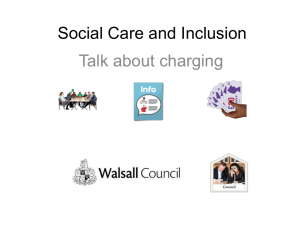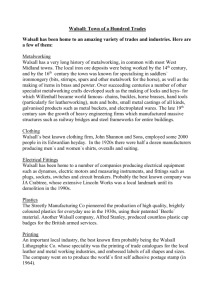Walsall Children and Young Peoples` Plan 2013 to
advertisement
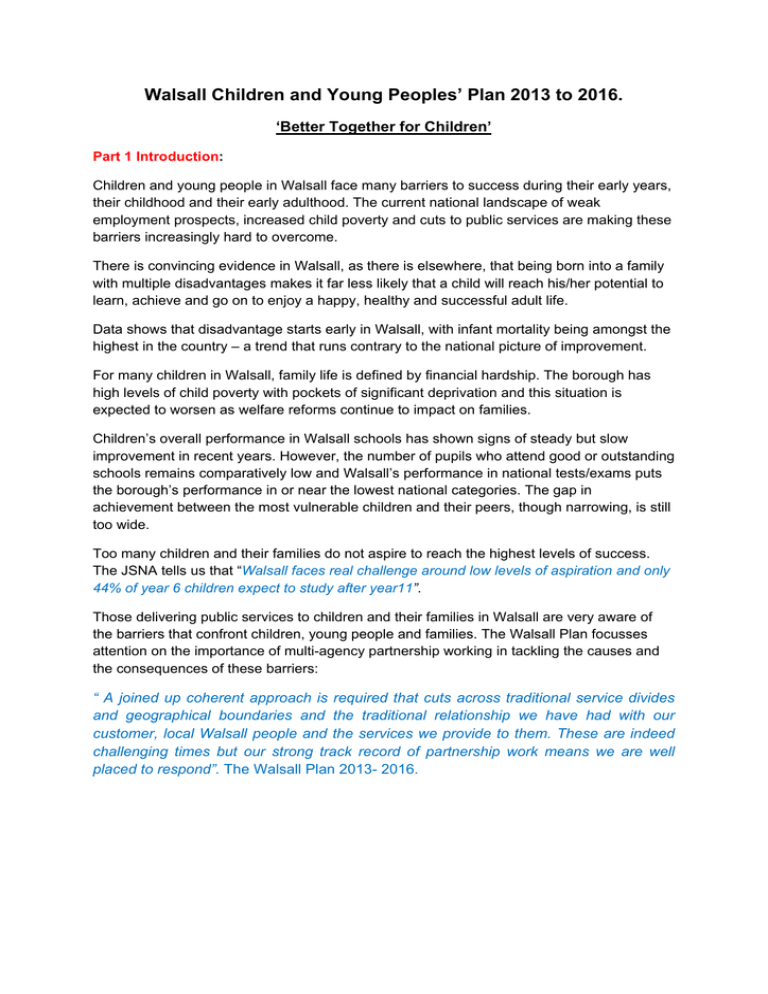
Walsall Children and Young Peoples’ Plan 2013 to 2016. ‘Better Together for Children’ Part 1 Introduction: Children and young people in Walsall face many barriers to success during their early years, their childhood and their early adulthood. The current national landscape of weak employment prospects, increased child poverty and cuts to public services are making these barriers increasingly hard to overcome. There is convincing evidence in Walsall, as there is elsewhere, that being born into a family with multiple disadvantages makes it far less likely that a child will reach his/her potential to learn, achieve and go on to enjoy a happy, healthy and successful adult life. Data shows that disadvantage starts early in Walsall, with infant mortality being amongst the highest in the country – a trend that runs contrary to the national picture of improvement. For many children in Walsall, family life is defined by financial hardship. The borough has high levels of child poverty with pockets of significant deprivation and this situation is expected to worsen as welfare reforms continue to impact on families. Children’s overall performance in Walsall schools has shown signs of steady but slow improvement in recent years. However, the number of pupils who attend good or outstanding schools remains comparatively low and Walsall’s performance in national tests/exams puts the borough’s performance in or near the lowest national categories. The gap in achievement between the most vulnerable children and their peers, though narrowing, is still too wide. Too many children and their families do not aspire to reach the highest levels of success. The JSNA tells us that “Walsall faces real challenge around low levels of aspiration and only 44% of year 6 children expect to study after year11”. Those delivering public services to children and their families in Walsall are very aware of the barriers that confront children, young people and families. The Walsall Plan focusses attention on the importance of multi-agency partnership working in tackling the causes and the consequences of these barriers: “ A joined up coherent approach is required that cuts across traditional service divides and geographical boundaries and the traditional relationship we have had with our customer, local Walsall people and the services we provide to them. These are indeed challenging times but our strong track record of partnership work means we are well placed to respond”. The Walsall Plan 2013- 2016. Part 2: The CYP Partnership Board: Roles and Responsibilities: The Children and Young People’s Partnership Board (the Board) is determined to play a central part in the governance of the strategic partnership in Walsall. The Walsall Plan, the Health and Well-being Action Plan and the Joint Strategic Needs Assessment have all been used as an important starting point in the discussion and debate that has shaped this Plan. Following the Ofsted inspection of LA safeguarding practice in 2012 and the resulting Improvement Notice, the Board has carefully examined how its work makes a difference to outcomes for children and young people. Partners have examined their own past practice as members of the Board and have challenged themselves and each other on whether they asked the right questions about how safe children were before the inspection. Every partner has committed to deliver more robust partnership working: at the frontline of their own service delivery as well as at Board level. The Board has resolved to be “Better Together for Children”: to work differently, to challenge on behalf of children and young people and to be held accountable individually and collectively for the difference the Partnership makes to outcomes for children and young people. After critically considering its role, the Board now believes that it can bring added value to its work by operating on 3 separate but related levels: 1 Contributing to the overarching corporate ambition for Walsall. The Walsall Plan sets out an ambitious programme of improvement to the economic and social fabric of the Borough that will impact positively on the lives of every citizen who lives in Walsall. The CYPP Board welcomes the opportunity it now has to contribute to the Walsall Plan priorities of; • • • • Supporting business to thrive and supporting local people into work Improving health including well being and independence for older people Creating Safe, Sustainable and Inclusive Communities Improving Safeguarding, Learning and The Life Chances for Children and Young People The Board has positioned its own improvement planning firmly within the framework for improvement set out in The Walsall Plan. The Board will respond positively to any requests from other partnership boards to contribute to their improvement priorities. 2 Single Agency Priorities The Board recognises that improving some of the most pressing indicators of children’s health and well- being is the principle responsibility of one agency within the Partnership. For example although all partners can champion the need for improved educational performance, it is schools and the teachers and head teachers within them that really impact on children’s learning and achievement. Similarly the delivery and monitoring of progress in the improvements demanded by the DfE Improvement Notice are, at the moment, primarily the responsibility of the council, WSCB and the Improvement Board. The Board will keep itself informed of progress in these “single agency responsibilities”. It will follow closely the progress of the implementation of the Safeguarding Improvement Plan and the Board will devote time in “Themed Meetings” to hear about and to question the pace and sustainability of improvements that the council is making to children’s social care. Such meetings will be a regular feature of the Board’s work programme and will be used to examine progress on the most pressing single agency issues. The accountable partner will provide partners with an appraisal of progress, reporting honestly and openly on any delay or difficulty in bringing about improvements. Members of the Board will probe the evidence presented and share any additional views from their own frontline practitioners: posing searching questions on the strength of evidence and the pace and sustainability of improvements. In addition, the Board will use the Deep Dive methodology to examine single agency issues for example following the implementation of the new School Improvement Strategy, members of the Board could work with head teachers and officers in the autumn of 2013 to determine the impact and outcomes of sector led improvement within clusters of schools. Other themed reviews may cover; • Attainment • Early help – including Walsall’s strengthening families programme • Safeguarding 3 Issues that can only be addressed through robust partnership working The Board has identified significant aspects where children’s life chances will only improve if all professional agencies work together to address the consequences of deep seated inequalities and lack of aspiration that are evident in many communities across Walsall. Central to the Board’s commitment to work differently is the creation of this Children and Young People’s Plan. In the making of the Plan, Board members modelled their determination to build a better partnership and to develop “a culture and ownership that shows we are in this together for and on behalf of children and young people.” (Board meeting Jan 2013.) The Board agreed that the process to create the Plan requires every organisation to show a commitment to: • • • • • Improve partnership working Take collective responsibility for the work of the Board and delivery of the new Plan Deliver a new Plan that is owned and delivered by all participants Ensure that the Plan is used by professionals and really informs day to day practice across all relevant services Identifying fewer and more focussed priorities – focussing on the really “hard to shift” outcomes for children and young people Each member of the Board was asked to identify the most significant priority for improvement as seen from their own professional standpoint. Partners were asked to base their decision on their answers to these questions: • • • • • • • • Where are the greatest risks to children and young people that you come into contact with? What is the data telling us? Who are the most vulnerable groups of children in this aspect? What are the “wicked” issues that can only be solved in a different, more coordinated and shared approach? Which outcomes for children are in greatest need of improvement? How could partners help your service to make more rapid or more sustained improvement to these outcomes? Which partner agencies could add most value to the work of your service in these issues? Are others outside Walsall doing better is in this aspect? Can we learn from them? Every member of the Board rose to this challenge and ten draft priorities were debated by the CYP Board on March 27th 2013. Each draft priority was assessed using the same criteria: of: • • • • Does this priority address the needs of one of the most vulnerable groups of children/young people in Walsall? Is there a real need for improvement in this area? Does this aspect really demand partnership working? Will partnership working significantly improve the outcome for children and young people? Can we be sure that success/ progress can be demonstrated through robust evidence? Following this discussion, some changes and additions were called for and the Board has now agreed 8 priorities for improvement over the coming 3 years. Each of these priorities is “sponsored” by a member of the CYP Board. The role of the priority sponsor is to: • • • • Agree success measures and strategic actions (see appendix 1) Produce a Priority Delivery Plan* outlining those agencies that will contribute to delivering the improved outcomes and what each will do. Hold to account each agency identified within the Delivery Plan to deliver what is set out there Report, as required, to the CYP Board – outlining progress and raising any performance issues that might delay or limit progress * Delivery Plans for each Priority can be found on our website and will be revised over time. www.walsallchildrenspartnership.org.uk Priorities Priority Sponsor 1 Supporting the most vulnerable families to provide the best start in life for children. Director of Childrens Services 2 Ensuring that children maintain a healthy weight. Director of Public Health 3 Reducing the harm caused by child sexual exploitation including children missing from school, care and home Chair of Walsall Safeguarding Children Board 4 Greater diversity of choice for learning, training and employment for young people Operational Director, Walsall Training Providers/Vice Principal Walsall College 5 Supporting the transition into adulthood for children and young people with Special Educational Needs or Disabilities by creating single ‘through life’ plans. Director of Adult Social Care 6 Promoting pride in the achievements of the children and young people of Walsall. Chair of Walsall Association of Secondary Headteachers 7 Better communication between frontline staff in all agencies that Head of Probation ‐ Walsall LDU support children and families 8 Reducing the impact of child poverty Head of Housing
